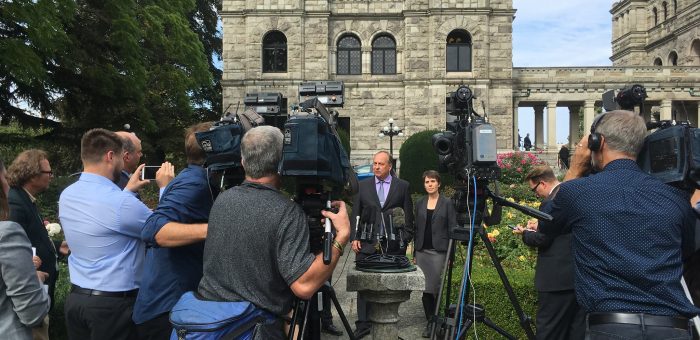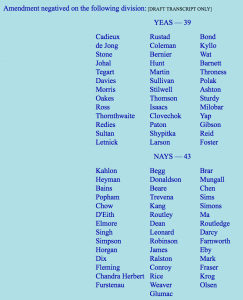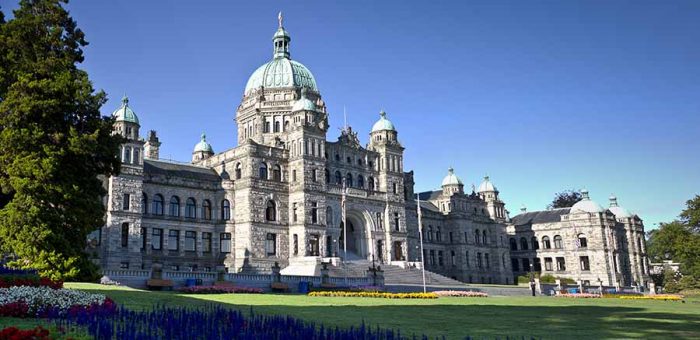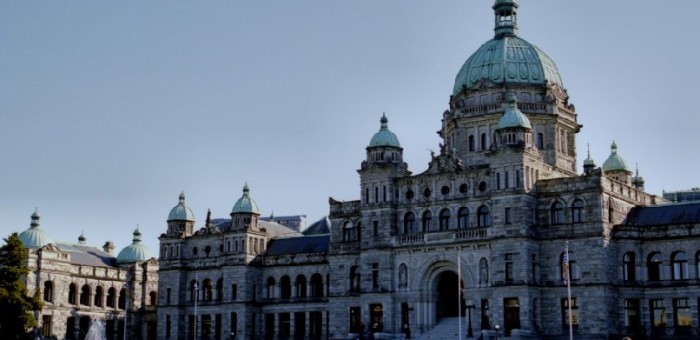Uncategorized
Bill 13: Pooled Registered Pension Plans Amendment Act
Today in the legislature we debated Bill 13: Pooled Registered Pension Plans Amendment Act at second reading.
The purpose of pooled registered pension plans are to reduce the burden on employers and make pensions more accessible to people who work for small businesses, freelance, and so forth.
Previously, when new multilateral agreements were made the full details of that agreement needed to be published in the BC Gazette for public information. This requirement didn’t fit with other BC statutes, where they just published the date of agreements, because this legislation was hastily modeled after the federal model that requires full agreement publication.
As it is already being published online, the BC Gazette is no longer the primary source people refer to for information.
Below I reproduce the text and video of my brief speech in support of this bill.
Text of Speech
A. Weaver: I rise to speak in favour and support of Bill 13, Pooled Registered Pension Plans Amendment Act, 2017. This is one of the rare moments in this Legislature when all members on all sides of the House can agree on the importance of moving forward with a particular bill. I can see that everyone’s happy that we can actually all agree on one issue here.
As we know, the purpose of pooled registered pension plans are to reduce the burden on employers and to make pensions more accessible to people and to people who work for, for example, small businesses, freelance operator contractors.
Previously, when new multilateral agreements were made, the full details of that agreement were needed to be published in the B.C. Gazette for public information. Now — of course the publishing is important — but that’s, in some sense, a relic of the past in this digital era that we are in today.
The requirement didn’t actually fit with other B.C. statutes as well, where they just published the date of the agreements. This initial legislation, I suspect, was rather hastily put together after the federal model that required full agreement publication and it to mirror up with federal government. It was a little bit burdensome, the process that was put in place.
It’s already published on-line. The B.C. Gazette is no longer the primary source that people go to refer to information. What this bill is doing, and why obviously we support it in its entirety, is it’s removing the requirement for full print publication of new multilateral agreements but still requires the date to be included in the Gazette.
All the multilateral agreement details will still be accessible to the public — if they so wish, on-line — but, in essence, what’s really happening is this bill is reducing publication costs, which were over $65 a page, and aligns print reporting requirements with other B.C. statutes. There are a few definitions that were previously made, and the regulations have been brought into the act since it was opened.
In conclusion, these are fairly minor changes, but their implication is very important. We believe that is a good piece of legislation, and we’re very proud to stand with our friends opposite and with government to support this legislation moving forward.
Video of Speech
On moving the fixed fall election date from October 2021 to October 2020
Today in the BC Legislature the BC Liberals proposed an amendment at committee stage to section 3 of Bill 5: Constitution Amendment Act 2017. The purpose of this amendment was to change the date of the next election from October 2021 to October 2020.
After listening to the arguments proposed by the BC Liberals I stood and spoke against the amendment.
The BC Liberals subsequently called for a standing vote and the amendment was defeated.
Below I reproduce the video and text of my statement. These outline the reasons why I voted the way I did. I also append the results of the vote.
Video of Statement
Text of Statement
A. Weaver: I rise to speak against the amendment put forward today by the official opposition, for a number of reasons. The amendment, of course, as we know, is to change the fixed election date to 2020 instead of 2021. The member opposite does himself a disservice when he continues to refer to government here as a coalition.
The member opposite, as he tries to put forward his wealth of expertise in democratic reform in British Columbia, should know at a very fundamental level that a coalition is not what we have here in British Columbia. It is a minority government, where the majority of members in this House support the B.C. NDP in government.
It would do this member well — and it would do opposition members opposite well — if they actually were to be factual in their responses and debates. To mislead British Columbians by talking about things like a B.C. coalition is not fitting of members of this place.
We know that it is a minority government, under the great vast tradition of Westminster parliamentary democracies, where the government of the day, the B.C. NDP, is supported by the three B.C. Green members in a minority, not a coalition. So I correct that for the record.
We know that under the Constitution Act, we must have an election every five years. The member opposite, again, in what I can only describe as a somewhat revisionist history, forgets to point out that in 1986, the Social Credit government, the 1986 elected Social Credit government did not have an election for five full years, until 1991. Five years — not four years, as was suggested by the members opposite.
Here, what is happening, and why I do not support the amendment and why I support the original legislation, is as follows. Again, in the tradition of Westminster parliamentary democracies, we stood here in this House and pointed out to the B.C. Liberals this past summer that they did not have the confidence of the House. We didn’t quietly spring this on them at the last minute. In fact, shortly after we signed the confidence and supply agreement…. As, I’m so pleased to say, is signed in a similar manner in New Zealand, between the labour party there and the Greens, celebrated today in some of their housing policies.
We signed this agreement and told British Columbians that we would have this agreement signed before the writ was returned because we wanted to instil confidence, and we wanted to ensure that British Columbians had certainty as we moved forward. So we messaged out to British Columbians, through this government, that on May 31, we were going to support a B.C. NDP minority government.
Hon. Speaker, members opposite, despite saying they would call back the House soon, took their time. We waited months for this to come. So to say it’s four and a half years is simply incorrect. We wasted months by this government, not willing to stand up and have confidence tested in this House, somehow in denial that we live in a parliamentary democracy. So to say it’s four and a half years is flat out wrong. That is why I continue to support the bill as it stands and speak against this amendment.
We talk about precedent. We had three independent MLAs in this House: one who formally was with the B.C. NDP, Bob Simpson, who sat as an independent; one who was formally with the B.C. Liberals, John van Dongen, who also sat as an independent; and then, of course, our friend and colleague Vicki Huntington, who was the only independent MLA in British Columbia to be re-elected as an independent. The three of them got together and they made recommendations.
They made recommendations to bring the election to the fall, as we did, but they also recommended and they also suggested that it was important to recognize that we need to go a little longer because of some time for Elections B.C. to adjust. So this is not some kind of surprise, as suggested by the member opposite, the member for Nechako Lakes. This is no surprise to British Columbians. This is precisely what happened in 1986 when the Social Credit government served for five years.
It’s what was recommended in the bill brought forward, which is somehow not being raised by members opposite. They refer to previous NDP opposition bills — not referring to the independent members’ bill, which was truly independent, with one member from the B.C. Liberals, one from the NDP, and Vicki Huntington, suggesting otherwise.
With that, hon. Speaker, I thank you for your time, and I do appreciate the opportunity to speak against this amendment.
The Vote
Committee Stage for Bill 5: Constitution Amendment Act
Today in the legislature we debated Bill 5: Constitution Amendment Act 2017 at committee stage. This is a bill I spoke in favour of last week at second reading.
Below I reproduce the text and videos of two short commentaries that I offered during the deliberations of Section 1 of the Bill (the section dealing with giving the BC Greens party status).
Norm Letnick, the MLA for Kelowna Lake Country, proposed an amendment to increase the number of elected MLAs that would give party status from two (in the bill) to three (presently it’s 4). He and John Rustad, the MLA for Nechako Lakes, presented a thoughtful justification. In the end, however, their amendment did not pass.
My first commentary, reproduced below, is a response to the comments from Norm Letnick and John Rustad. My second commentary, also reproduced below, is in response to a provocative speech from Ralph Sultan, the MLA for West Vancouver-Capilano.
Video of my first commentary
Text of my first commentary
A. Weaver: I’d like to thank the member for Kelowna-Lake Country and the member for Nechako Lakes for their very thoughtful probing of this section in the legislation for us, and thank the minister and staff for their responses.
Obviously, this is a section that affects us directly as three independent MLAs that were elected as B.C. Greens in the last election. As the member for Kelowna-Lake Country has said, we are not independent. We clearly ran on a platform. We clearly articulated that platform across the province of British Columbia, and the three of us were elected on that platform, the B.C. Green platform. I agree with the member for Kelowna–Lake Country. When you run on a political platform, it’s very difficult to be viewed as independent, so obviously we support that statement.
The question boils down to three versus two versus four, and that’s what we’re debating here. When I look at this, I ask the question: What about the future? What about the next election? I am drawn by the analogy to 2001, where we had a situation — and prior to that, in the 1990s — where the Reform Party also had a number of MLAs, two MLAs sitting here in the Legislature.
I look at that, and I think that there should have been, at the time, party status for these people. The subsequent questions about whether the funding should be this or whether the names and titles should be that are very good questions. I think we can address those in different forums. So, for example, LAMC would deal with any funding issues. I agree with the member. It doesn’t really make sense for three of us to have a Deputy Whip. Like, we don’t.
I would like to put at ease the members opposite with respect to offices in Vancouver. Again, I think, ultimately, we are judged by the taxpayer. What would the taxpayer say, if the B.C. Green Party were suddenly to look at a big office in Vancouver with no MLAs sitting in Metro Vancouver? I would suggest that the jury of the public would be quite judgmental on that, so this is not something we’re actively pursuing because it’s not something, frankly, that we think is correct. If there had been four of us, and two were from Vancouver and two from Victoria, maybe a slightly different thing. In our case, we’re probably not actively pursue this.
It’s important, again, coming back to the three-versus-two to think, what about the next election? I hope that we can bring it upon ourselves to actively campaign in the upcoming referendum for proportional representation. I know that the official opposition will do this, with humble….
Interjection.
A. Weaver: The former official opposition. It’s hard to take that off your….
Interjection.
A. Weaver: I know, I’ve seen other MLAs in the opposition say the same thing.
I know that the government will campaign for it, as we will, obviously. I know that in the throne speech of the summer, the B.C. Liberals said they were supporting proportional representation, and there are members on record who support it as well. If we get this proportional representation passing in the fall of next year, we’ll move to a 2021 election wherein there may be a multitude of parties. Wouldn’t it be healthy for us to recognize a democracy wherein two parties can be recognized as two parties?
Now, I understand. We can’t have…. Let’s suppose two members opposite decide that they want to form the disgruntled Liberal Party, and they so register according to rules, coming up to suggesting that they should then have a question every day. Well, that’s not something that’s within the…. We have to look to precedent there, and it would start to become silly.
The precedent in the House, of course, is that when the NDP had two and when the Reform had two, there was a question a day, typically with a third party. We haven’t had four parties, and that would be a new precedent. I think we would look with the members opposite very carefully to say: “What is fair? What is truly representative?” Is it that two members are disgruntled, and now they figure they should have undue influence in this Legislature?
I’m not sure. They ran on a platform. They would have run on a platform that was a Liberal platform, but now they’re suddenly claiming to be something different. It’s a slightly different situation. I’m sure, seeing the openness of the government here to providing us legislative drafters, that this is something that we could discuss.
I believe, if we think to the future, that the number two is the correct number, in light of the history here in British Columbia. But I recognize the concerns that have been raised by both the member for Kelowna–Lake Country and the member for Nechako Lakes and agree that many of these concerns would have to be addressed. They’re hypothetical right now, but they would have to be addressed. I think that the legislation, which appeals to LAMC as well as the Legislature as a whole, could indeed address that, if that situation were to arise.
I don’t think it’ll arise till the next election anyway, because we have a big happy camp over on that side — unless, of course, we could actually end this debate if two members opposite would like to come and join the B.C. Green Party here. We’d have five and away we go.
J. Rustad: Why two? You just need one to get four.
A. Weaver: We’ll take two.
With that, I thank you, and I look forward to the vote.
Text of Ralph Sultan Commentary
R. Sultan: I think the first point to be made is that this bill is only part of a package of bills totalling four in number which, cumulatively, will change the working of democracy in the provincial government in British Columbia. I really believe that. And I accuse the government of employing a salami technique to introduce one little bill at a time and distract the argument on this one — do a discussion of LAMC or perhaps an office in Vancouver —when the grand sum total is much more far-reaching and certainly changes parliament as we know it.
I support the amendment to Bill 5 reducing from three to two the number of persons required to constitute a fully fledged political party in this House. The point is made: “Well, really. Three, five — does it really make much difference?” Well, it’s a 50 percent difference. Certainly, I think, the precedent to go to two members is very significant indeed.
The rumoured reason for this amendment, the scuttlebutt in the corridors, is that the Green Party is faced with the loss of a member crossing the floor, and they’re going to only have two members. My heavens. Therefore, we must change the laws of parliament to preserve the sanctity of the Green Party as a party with full standing. If that is indeed the reason — it’s pure speculation on my part; I would not expect either confirmation or denial of that possibility — it strikes me as being a very trivial reason and not one that should constitute the foundation of our government.
It’s also speculated — and perhaps I can speak with a little bit more personal knowledge on this matter — that some members in the…. What was the label attached? The disgruntled Liberal faction would split off and form their own parties. Indeed, the arithmetic suggests…. We have 42 sitting members, which might, theoretically, under this law, enable 21 new parties, in the extreme. A rather a radical suggestion, but legally possible, I presume.
As the member for Kelowna–Lake Country has already enumerated, and as he reminded me, even though we only have two or three members, they are entitled to party leader, House Leader, Whip, caucus chair, Deputy Whip, an office in Vancouver, members of LAMC, two questions each in QP — we’ll have to extend QP for most of the day, it appears — a certain amount of research money — and, certainly, will dilute the official opposition integrity and strength, which may, in fact, be the ultimate purpose of this amendment.
I have to point out that this fundamental change in our democratic process is being introduced at a time when the official opposition is crippled by being in the middle of a leadership campaign, and we are being distracted. I don’t think that this is time for calm reflection and judicious weighing in balance of the structure of this House when fully one half of the House is distracted with other very important functions.
Finally, have we considered — and I will pose it as a question to the Attorney — what the lessons may be from other jurisdictions? Here are five, for example, drawn from Europe. Belgium in 2010, and 11 parties in parliament. They took 581 days to negotiate a government. For the rest of the time, they really did not have a functioning government.
We’ve seen the logrolling, the midnight meetings and so on that went into the makeup of the coalition or whatever it’s called between the Greens and the NDP. Well, multiply that exponentially as we increase the number of parties we’re talking about.
Consider the Netherlands in 2017 — 208 days to form a government, a four-party coalition government involving 13 parties.
Spain in 2015 — 314 days without a government. No government was actually formed. They held a new election six months later, contested by 12 parties — 12 parties in parliament.
Italy has had two separate systems since 1993 — 65 governments in 70 years, hardly a formula for stability. Currently 28 parties — 28 parties in Italy.
Germany, I have not added up the number of parties, but it strikes me as being worthy of note that one of the parties that will take seats in the Reichstag, if I get the name of their parliament correct, will be, really, a reborn Nazi party.
This is an example of what happens when you have small, very special-purpose parties, dealing with a group of zealots who are bound and determined to be represented in parliament. I do not think that this is a formula for stability and certainty or, in fact, good public policy.
So I must ask the Attorney. When the changes, when we add up the slices of salami, are so significant, isn’t it remarkable, with a government noted for its rush to consult on everything from fish farms to taxi cab licences, that we see no outside consultation, no outside experts, no deliberation beyond this particular hall this afternoon and in the ensuing days, when we debate the other parts of the package as individual pieces — that we are having otherwise thought and deliberation presented for our consideration?
I find it unusual. I could use stronger language. Let me quote the former Attorney on this subject. “This bill is important far beyond the suggestion of its short number of sections in terms of its effect on our democracy. This is part of a package brought forward by the NDP in recent days consisting of Bill 3, Bill 5, Bill 6, and Bill 9. The cumulative effect of them being to change our democratic system substantively, with no consultation, no public consultation whatsoever.”
No public consultation whatsoever. We’re just going to pass it and — what the hell — get on with life. No reference to any expert panels, and no consultation more broadly than in the cabinet room.
So my question to the current Attorney is: why not? Why no consultation? Is not the future operation of this House more important than how we determine taxi licences and fish farms?
Video of my second commentary
Text of my second commentary
A. Weaver: I think the last comment needs to go challenged. We have an assertion here that the legislation going from three to two is somehow — two to three — is about power.
Now, I recognize that the mindset of B.C. Liberals is nothing more than: “We’ve got to get into power, and forget public policy. Forget public policy. Let’s not work together. It’s all about the power.”
You don’t have to believe me. You could go to the education parliamentary democracy meeting and listen to one of the members from Abbotsford who told the teachers from British Columbia here that the role of the official opposition is to get into power.
I understand why the member for West Vancouver–Capilano thinks it’s about power. I understand that because that’s all they can think about.
What we’re trying to do here is actually work together — work together to put people first, not to put our corporate donors first, and I recognize how….
Interjections.
The Chair: Through the Chair.
A. Weaver: I recognize how banning corporate donations….
The Chair: On the amendment, Member.
A. Weaver: I do appreciate being brought back to the amendment. The reason why I so diverged is because we were specifically addressed by the member opposite with respect to a package of bills which this is not a package of bills.
We’re focusing specifically on one amendment. I’d love to listen to the further discussions of this amendment, but to suggest that somehow the National Socialist Party will arrive in British Columbia because of this amendment is truly outrageous.
Bill 9 — Miscellaneous Statutes (Minor Corrections) Amendment Act, 2017
Today in the legislature we debated Bill 9 — Miscellaneous Statutes (Minor Corrections) Amendment Act, 2017. This bill corrects a number of very minor errors in legislation that have been found over the years. Changes include things like the addition of a few commas, correcting spelling mistakes, including an ‘and’, replacing ‘whom’ with ‘who’ and numerous other trivial modifications.
Below are the text and video of my not to be taken too seriously comments on Bill 9.
Text of Speech
A. Weaver: I see that the Attorney General was very excited and wanted to close debate on this very important bill that corrects quite a number of small, minor issues over quite a number of statutes that have occurred over many, many years.
I take my place to speak, obviously, in favour. But I’d like to cover this in a little detail, because I think that it’s important that we get to the bottom of some of these changes to see how things are playing out. And I must admit these are not trivial changes in some cases.
As the hon. member for Prince George–Mackenzie was able to point out, this, of course, is…. Other tools of doing this…. We have an incredible legislative counsel working with the Attorney General’s office to keep our bills and statutes updated.
But as I was reading through this and as I was going through the various bills, checking why a comma was changed and so forth, it became clear to me that it’s not as easy to see why the changes occur as one might think.
For example, if we start with the very first change in this bill under Administrative Tribunal Statutes Amendment Act, 2015: “1 Section 70 (b) of the Administrative Tribunals Statutes Amendment Act, 2015, S.B.C. 2015, c. 10, as it amends section 12 (2) (d) of the Farm Practices Protection (Right to Farm) Act, R.S.B.C. 1996, c. 131, is amended by striking out ‘purposes’ and substituting ‘purpose.'” So rather than having purposes, there’s only one purpose.
But this is where it gets confusing. I went to section 10.3, where it said the following. In section 10, for the purposes of section 10.3, we’re directed to the Farm Practices Act. It says: “Stop a person whom the inspector….” I would have thought that the legislative drafters would have caught that it’s not “whom the inspector” but it’s “who the inspector,” because that is grammatically incorrect.
I’m not sure that, in fact, the Farm Practices Protection Act was changed in this. But I will point out that later in this, we do have a change in this act where the word “whom” is changed to “who.”
Just bear with me for a second. It’s a very complex and long bill here. Look in the Animal Health Act, No. 2 of the changes. It said: “Section 23 (1) (a) of the Animal Health Act, S.B.C. 2014, c. 16, is amended by striking out ‘whom’ and substituting ‘who.'” I agree with that — grammatically correct, very important to do.
But what I cannot believe was missed in this bill — and frankly, shame on government for missing this — in the change on section 1, it refers specifically to section 12.2(d) of the Farm Practices Protection (Right to Farm) Act, which says “stop a person whom the inspector respectfully believes is the person responsible for an animal or an animal product or by-product.” Shocking, reckless indifference to grammar.
I jest, as I’m sure you might imagine. The member Vancouver–West End isn’t sure whether I’m jesting or not, but there will be more of these to come. But it is kind of ironic as I was actually going through these, I did notice in the first reference, the “whom” wasn’t corrected to “who,” where in the very next thing, the “whom” was corrected to “who,” which is kind of interesting. But it gets complex.
When you go to the farm act again, and you’re coming in, it says “For the purpose of Section 10.3, respecting engagement and retention of specialists and consultants by the board,” the problem I’ve got here is that it refers to section 10, which was repealed. So it seems to me, in (1) that we’re correcting something that refers to another act, from “purposes” to “purpose,” which refers to another section that was repealed.
So I’m confused. I’m sure I’ll probe this in thorough detail during committee stage of this bill, as we try to get to the bottom of this critical missing section. I could just be in error.
There are many, many such changes here, most of which I’m sure have compelling reasons to actually support…. For example, the third one says…. In the Assessment Act, we’re striking out “sea going” and substituting “sea-going.” Now, that’s important because “sea going” could mean the sea is going, but “sea-going” implies sea-going. There’s a very important difference there, and I’m glad that this is picked out.
Also, in (4), it’s: “under the Canada Pension Plan.” But should you not know that the Canada Pension Plan needs to be highlighted…. We’re changing that to highlight Canada Pension Plan in italics, which is an important change for those who recognize that this needs to be brought forward and illustrated as significantly different from the rest.
We can go forward to the Budget Transparency and Accountability Act. There’s an “and” added here. It’s very important. Of course, I could see that. We’ve got some section issues. There’s a comma that was needed as well.
We’ve got “paragraphs” changing to “paragraph.” Heaven forbid we refer to “paragraphs” instead of just the “paragraph.”
There are many more. One of the more important ones is section 15 of the bill, where we talk about the Forensic Psychiatry Act. It’s critical. This is the Forensic Psychiatry Act. In today’s society, mental health issues are first and foremost in what we’re doing, and heaven forbid that we refer to an “inpatient” rather than “in-patient.” Now, I’m confused about that, and it’s causing me some mental anguish, particularly as it’s in the Forensic Psychiatry Act.
When I look it up in the Merriam-Webster dictionary, “inpatient” is “inpatient.” I know it sounds like “impatient,” which I’m sure the members are right now, as I’m speaking, but “inpatient” seems to be okay.
Interjection.
A. Weaver: The member for Surrey–White Rock suggests that I do not jest when I say that.
There are many. The Great Bear Rainforest Act, an act brought in very recently. Instead of now saying “new-non GBR, it’s “new non-GBR.” Not sure quite what the change is in that…. Oh, sorry. The hyphen was in the wrong place. It was “new-non GBR,” and now it’s “new non-GBR.” Another important change.
I could go on. I could on with the many, many changes.
Interjection.
A. Weaver: Oh, the member for Chilliwack-Kent would like me to go on.
I want to come to the schedules at the back, where the changes are. There are so many of these commas and others, which are important, obviously. We come to the schedules, and these are some of the most dramatic changes that need to be done.
On page 10 of this bill, it says “in so far” as opposed to “insofar” with no spaces. It’s replacing that in so many places, in 12 different bills. Sloppiness, going back to the 1990s. Heaven forbid we look at the error.
It was made in all the bills. The Arbitration Act, 1996. The Cooperative Association Act, 1999. The Creston Valley Wildlife Act, 1996. The Frustrated Contract Act, 1996. I didn’t know such an act existed. The Interpretation Act, 1996. The labour relations code, 1996. My good friends the NDP here shouldn’t have made the mistake in that one. The Land Title Act, 1996. The Ministry of Provincial Secretary and Government Services Act, 1996. The Offence Act, 1996. The Railway Act, 1996. The Securities Transfer Act, 2007. This error clearly, while originating in the decadent eras of the 1990s, perpetuated through sequential Liberal governments and was not corrected in the 2007 bill, brought in as the Securities Transfer Act. I’m so glad it’s being changed. Grammaticists and spell-checkers around the world are celebrating today.
On Schedule 2. I must admit that I don’t understand this. I guess I do. In 13 — 13 no less — bills, most of which were done by the B.C. Liberals, “mail box” is corrected to “mailbox” with no space. Now, that’s important. It is not “male box.” They’re not saying “male box.” I get why some males should be in a box. They’re saying “mail box,” being replaced by “mailbox,” no space.
Now, I don’t understand that one. I thought “mail box” was pretty clear, that it’s a mail box, but apparently not. So I do appreciate these changes, and I thank government from the bottom of my heart for bringing these changes forward.
We also have, in Schedule 3, “merit based processes” being corrected to “merit-based processes” in many, many places as well. And finally, Schedule 4 on this bill, at the end….
Interjection.
A. Weaver: The member for Cariboo-Chilcotin is taking such an aggrieved point of view about this bill. Oh, my goodness.
Interjections.
A. Weaver: Cariboo North. I’m sorry. I’m looking forward to her standing and speaking passionately in support of this, as I’m about to head to Education estimates in about one minute.
The final change that I think needs to be celebrated here today is “self propelled” being corrected to “self-propelled.”
With that, I will self-propel myself back into my seat.
Video of Speech
Apply for 2017 BC Youth Parliament
The 89th British Columbia Youth Parliament will hold its parliamentary session in Victoria at the Provincial Legislative Chambers from December 27 to 31, 2017. The Youth Parliament is a province-wide non-partisan organization for young people ages 16 to 21. It teaches citizenship skills through participation in the December parliamentary session and in community service activities throughout the year. Youth Parliament is a one year commitment.
The BC Youth Parliament is non-partisan and applicants need only be interested in learning more about the parliamentary process and in serving their community.
The application is available here, along with an informational brochure and poster.
All applications must be received by October 24, 2017. Selected applicants will be notified in early November.









